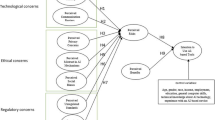Abstract
Neuropsychologists face many opportunities and challenges in the modern health care system. New technologies such as the electronic medical record, pressure to provide services to an increasing number of patients, especially in rural areas, and health care professionals expanding their scope of work, can present with ethical challenges. This article outlines several potential ethical dilemmas in modern health care and offers possible solutions utilizing an ethical decision-making strategy. A positive ethics approach is emphasized, and neuropsychologists are encouraged to adopt this perspective to aspire to the highest level of ethical practice.
Similar content being viewed by others
References
Allott, K., & Lloyd, S. (2009). The provision of neuropsychological services in rural/regional settings: Professional and ethical issues. Applied Neuropsychology, 16(3), 193–206.
American Academy of Clinical Neuropsychology. (2007). Practice guidelines for neuropsychological assessment and consultation. The Clinical Neuropsychologist, 21(2), 209–231. doi:10.1080/13825580601025932
American Psychological Association. (2010). Ethical principles of psychologists and code of conduct. Retrieved October 1, 2015 from http://www.apa.org/ethics/code/index.aspx
Baker, D. C., & Bufka, L. F. (2011). Preparing for the telehealth world: Navigating legal, regulatory, reimbursement, and ethical issues in an electronic age. Professional Psychology: Research and Practice, 42(6), 405–411. doi:10.1037/a0025037
Belar, C. D. (2012). Reflections on the future: Psychology as a health profession. Professional Psychology: Research and Practice, 43(6), 545–550. doi:10.1037/a0029633
Brittain, J. L., Frances, J. P., & Barth, J. T. (1995). Ethical issues and dilemmas in neuropsychological practice reported by ABCN diplomates. Advances in Medical Psychotherapy, 8, 1–22.
Bush, S. S. (2007). Ethical decision making in clinical neuropsychology. New York: Oxford University Press.
Bush, S. S. (2009). Geriatric mental health ethics: A casebook. New York: Springer Publishing Company.
Bush, S.S. (2014). Ethics-related references. Retrieved October 16, 2015 from http://www.theaacn.org/userdocuments/np_ethics_references_(feb2014).pdf
Cullum, M., Hynan, L., Grosch, M., Parikh, M., & Weiner, M. (2014). Teleneuropsychology: Evidence for video teleconference-based neuropsychological assessment. Journal of the International Neuropsychological Society, 20(10), 1028–1033.
Grosch, M. C., Gottlieb, M. C., & Cullum, C. M. (2011). Initial practice recommendations for teleneuropsychology. The Clinical Neuropsychologist, 25(7), 1119–1133.
Handelsman, M. M., Knapp, S., & Gottlieb, M. (2002). Positive ethics. In C. R. Snyder & S. J. Lopez (Eds.), Handbook of positive psychology (pp. 731–744). New York: Oxford University Press.
Harrell, K. M., Wilkins, S. S., Connor, M. K., & Chodosh, J. (2014). Telemedicine and the evaluation of cognitive impairment: The additive value of neuropsychological assessment. Journal of the American Medical Directors Association, 15(8), 600–606.
Hilsabeck, R. C., Hietpas, T. L., & McCoy, K. J. M. (2014). Satisfaction of referring providers with neuropsychological services within a Veterans Administration Medical Center. Archives of Clinical Neuropsychology, 29, 131–140.
Johnson-Greene, D., & the NAN Policy & Planning Committee. (2005). Informed consent in clinical neuropsychology practice: Official statement of the national academy of neuro- psychology. Archives of Clinical Neuropsychology, 20, 335–340.
Kaufmann, P. M. (2009). Protecting raw data and psychological tests from wrongful disclosure: A primer on the law and other persuasive strategies. The Clinical Neuropsychologist, 23(7), 1130–115.
Kellermann, A. L., Saultz, J. W., Mehrotra, A., Jones, S. S., & Dalal, S. (2013). Primary care technicians: A solution to the primary care workforce gap. Health Affairs, 32(11), 1893–1898.
Knapp, S., & VandeCreek, L. (2006). Practical ethics for psychologists: A positive approach. Washington, DC: American Psychological Association.
Koocher, G. P. (2007). Twenty-first century ethical challenges for psychology. American Psychologist, 62(5), 375.
Nasreddine, Z. S., Phillips, N. A., Bédirian, V., Charbonneau, S., Whitehead, V., Collin, I., & Chertkow, H. (2005). The Montreal cognitive assessment, MoCA: A brief screening tool for mild cognitive impairment. Journal of the American Geriatrics Society, 53(4), 695–699.
Nies, K. J., & Marcopulos, B. A. (2003). Neuropsychology in rural and small communities: An Appalachian perspective. In G. J. Lamberty, J. C. Courtney, & R. L. Heilbronner (Eds.), The practice of neuropsychology. Lisse, NL: Swets & Zeitlinger, Publishers.
Public Law Number 104–191, 110 Stat. 1936 (1996). Health Insurance Portability and Accountability Act of 1996.
Puente, A. E., Adams, R., Barr, W. B., Bush, S. S., Ruff, R. M., Barth, J. T., & Tröster, A. I. (2006). The use, education, training and supervision of neuropsychological test technicians (psychometrists) in clinical practice: Official statement of the National Academy of Neuropsychology. Archives of Clinical Neuropsychology, 21, 837–839.
Pyper, C., Amery, J., Watson, M., & Crook, C. (2004). Patients’ experiences when accessing their on-line electronic patient records in primary care. British Journal of General Practice, 54(498), 38–43.
Schopp, L., Johnstone, B., & Merrell, D. (2000). Telehealth and neuropsychological assessment: New opportunities for psychologists. Professional Psychology: Research and Practice, 31(2), 179.
Wechsler, D. (2003). Wechsler Intelligence Scale for Children-WISC-IV. San Antonio, TX: Psychological Corporation.
Wood, J. A. V., Miller, T. W., & Hargrove, D. S. (2005). Clinical supervision in rural settings: A telehealth model. Professional Psychology: Research and Practice, 36, 173–179.
Author information
Authors and Affiliations
Corresponding author
Ethics declarations
Conflict of Interest
The authors declare that they have no competing interests.
Rights and permissions
About this article
Cite this article
Tussey, C.M., Marcopulos, B.A. & Bush, S.S. Evolving Roles, Innovative Practice, and Rapid Technology Growth: Remaining Ethical in Modern Clinical Neuropsychology. Psychol. Inj. and Law 8, 281–288 (2015). https://doi.org/10.1007/s12207-015-9240-4
Received:
Accepted:
Published:
Issue Date:
DOI: https://doi.org/10.1007/s12207-015-9240-4



